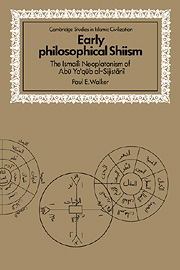EPILOGUE: THE USE AND CONTROL OF REASON
Published online by Cambridge University Press: 02 November 2009
Summary
Throughout the preceding discussions, al-Sijistānī continued to receive the benefit of most doubts in the conflict between looking at him as a thinker and philosopher and as an exponent of a highly partisan ideology. At this point, however, as a way of bringing a conclusion to this study of his writings and his place in Islamic intellectual history, it is important to restate some basic problems and to examine them from the negative side. In so doing those doubts inevitably arise again, this time not to be ignored or glossed over.
In searching for the Neoplatonist within his writings, elements of his Ismaili teachings took a less prominent place than they might when viewed from a wider and more comprehensive perspective. By isolating this one element in al-Sijistānī's thought, other issues were left unexplained or, at the least, understated. However, the philosophical foundations of this form of Shiism were merged intricately in a fabric far more complicated than the previous analysis disclosed. Even so certain tensions in that material – such as those between philosophy and history, between scientific inquiry and revelation, between tradition and authority – were already so naturally graphic they were hard to conceal. They are intrinsic to the kind of partisan ideology espoused by the Ismailis, even if and when that partisanship comprises within it major philosophical ideas which themselves have separate intellectual importance.
- Type
- Chapter
- Information
- Early Philosophical ShiismThe Isma'ili Neoplatonism of Abu Ya'qub al-Sijistani, pp. 143 - 156Publisher: Cambridge University PressPrint publication year: 1993

